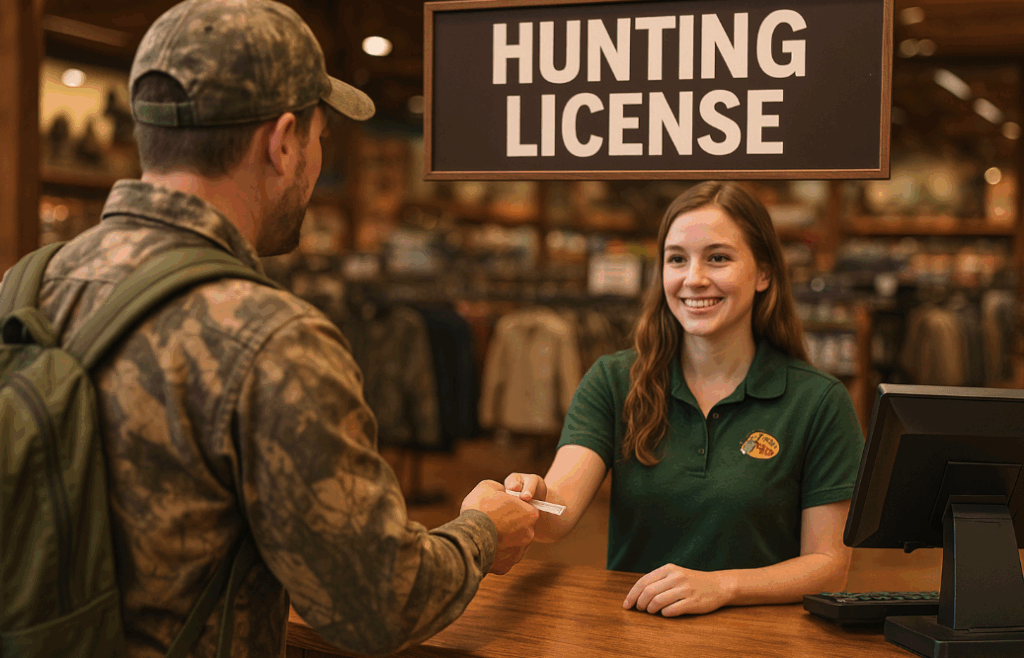Take an Official State-Approved Hunter Safety Course
Take Hunter-Trapper Education (or start under the Mentored Hunting Program), then hop on HuntFishPA or visit an issuing agent to buy your license and any add-on permits you need (antlerless deer, archery, etc.). You can carry your license digitally for most things—just remember you’ll still need the physical harvest tags in your pocket for big game.

Pennsylvania sells licenses through HuntFishPA (online) and hundreds of license issuing agents (in-store). First-time hunters usually need Hunter-Trapper Education (HTE); brand-new hunters of any age can also begin under the Mentored Hunting Program with a mentored permit. Pennsylvania
Take Hunter-Trapper Education (or start as a Mentored hunter).
Choose your license/permit (resident, junior/senior, nonresident, mentored).
Buy online at HuntFishPA or in person at an issuing agent.
Add any required add-ons (e.g., antlerless deer license, special spring turkey, migratory bird/duck stamp).
Carry your license (digital is OK for many privileges) and your physical harvest tags for big game.
Tag immediately and report harvests on time.
All first-time hunters/trappers must pass HTE—either in-person or online. Online options are available for hunters 16 years or older. Pennsylvania honors other states’ certifications as well.
Find PAGC-Approved Hunter Education Course >>
Anyone—youth or adult—can begin with a Mentored Hunting Permit and hunt under a licensed mentor (21+). Mentored hunters 12+ may participate for up to three license years, then must complete HTE to buy a regular license. Permit fees vary by age and residency.
What to know
Permit holders may pursue select species; some require add-ons (e.g., Migratory Game Bird License for doves/waterfowl; pheasant permit for pheasant).
Waterfowl: mentored hunters need the PA migratory license; age 16+ also need a Federal Duck Stamp.
Resident Adult Hunting (roughly ages 17–64): Includes core hunting privileges and typically comes with one antlered deer tag and spring/fall turkey tags.
Resident Junior (youth, ages 12–16): Discounted youth license with small-game privileges and big-game tags as provided for the year.
Resident Senior (65+): Reduced-fee annual and optional lifetime offerings; lifetime holders usually renew annually to receive current-year tags.
Nonresident Adult: Full privileges for nonresidents (fees higher than resident).
Short-term Small-Game (nonresident): Time-limited small-game option; does not include big-game privileges.
Mentored permits (all ages, by category): Permit to hunt under a qualified mentor; includes limited species/tag options that vary by age group.
Note: Names, eligibility ages, included tags, and fees can change each license year. Always confirm details in the current license catalog.
Antlerless deer (doe) licenses
Allocated by Wildlife Management Unit (WMU) and sold in rounds with personal limits. Timing, limits, and any resident preference windows can change—check HuntFishPA for current availability and deadlines.
Turkey
The general license typically includes one spring and one fall turkey tag. A Special Spring Turkey license (second gobbler) is usually available as an add-on.
Waterfowl & doves
All migratory bird hunters need the PA Migratory Game Bird (HIP) requirement; age 16+ waterfowlers also need the Federal Duck Stamp (e-stamp generally valid through the season).
Archery / Muzzleloader / Pheasant / DMAP
Add archery or muzzleloader privileges for deer seasons, a pheasant permit for stocked pheasant areas, and DMAP permits where offered.
Landowner & military/veteran options
Certain cooperating landowners may qualify for a discounted resident landowner license (not a blanket exemption). Resident military and disabled-veteran licenses are available; requirements and pricing vary—see the current catalog.
Where to buy:
Online: HuntFishPA (licenses ship by mail; you also receive digital copies immediately—harvest tags are mailed).
In person: Issuing agents print licenses and tags on durable stock immediately. Pennsylvania Government
Carrying in the field:
You may carry digital licenses for many privileges.
For big game (deer, bear, elk, turkey) you must have physical harvest tags printed on official stock. Pennsylvania Government
Tag immediately before moving big game from the harvest site (attach to ear for deer/bear, body for elk, leg for turkey). Pennsylvania Government
Report deer & turkey harvests within 10 days (within 5 days for mentored hunters or those using homemade tags). Report online, by phone, or by mail. Pennsylvania Government
Yes. PA does not have a general landowner license exemption. Cooperators in the Hunter Access Program can get a discounted landowner license and a landowner antlerless option, but still need to be licensed. Pennsylvania Government
For most hunters: 1 antlered deer tag, 1 fall turkey tag, 1 spring turkey tag, and small game privileges (species-specific add-ons may be required). Pennsylvania Government
Buy or manage licenses: HuntFishPA. huntfish.pa.gov
License types & fees: PGC License Types page & 2025–26 License Catalog. Pennsylvania Government
Antlerless license rounds & quotas: PGC/PA.gov antlerless page; HuntFishPA WMU availability. Pennsylvania Governmenthuntfish.pa.gov
Migratory bird & duck stamp rules: PGC migratory seasons update. Pennsylvania Government
This is a FREE Boating course.